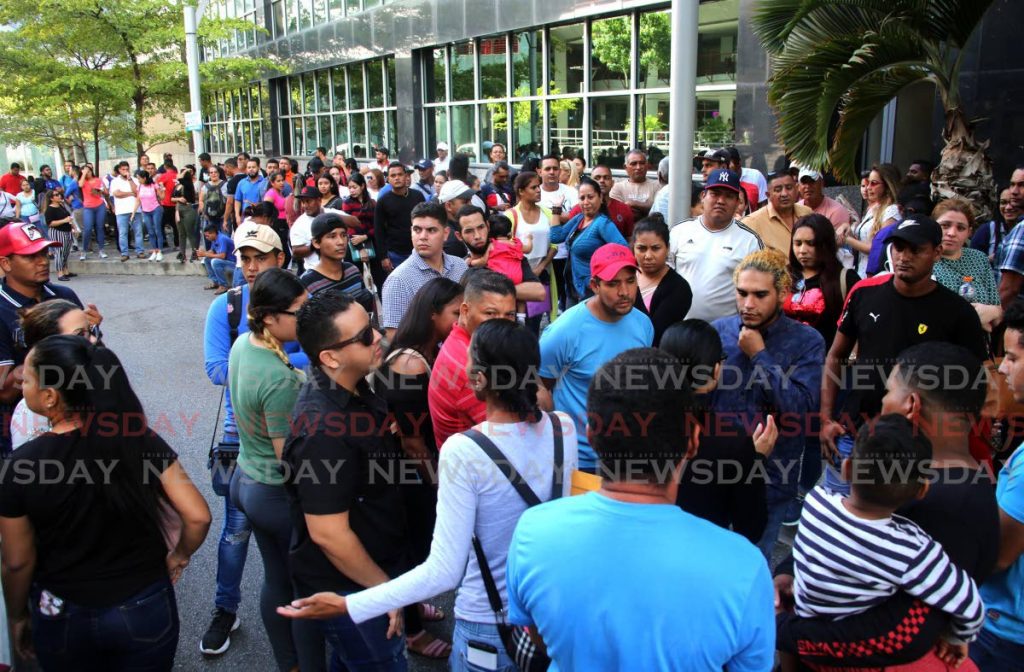Covid19 and the Venezuelan migrant community

DARCELLE DOODNATH
It’s a cool Sunday evening and I am driving through a narrow, unpaved street in Morne Diablo, Penal. Bushes on either side, up ahead I see the lights from a small building sectioned off into four tiny apartments, with several little children playing in the yard, while the adults sit on benches outside facing the road.
One man is shaving over a sink in front of a small mirror propped up against the wall. No one is wearing a mask. No one is practising anything resembling social distancing. My phone rings, and I hear the familiar ripple of broken Spanish explaining to me that I am close to the house, and that if I can help with pampers and milk for the baby, “Dios te bendiga,” the voice says. God bless you.
Thousands of Venezuelan nationals have made this country their home over the past few months, uprooting their lives and families in the wave of mass migration to our twin islands as a means of escaping the humanitarian crisis caused by political turmoil and socioeconomic instability.
Small communities of Spanish-speakers now exist all over TT, with family members working jobs that pay menially so that they can feed their siblings and children, many of them religiously sending remittances back home to their loved ones. They patronise local businesses, in particular, supermarkets, spending the vast majority of whatever meagre income they earn on rent and food.
Via social media forums, they communicate about issues affecting their community such as information on the migrant registration process and social services that may not be at their disposal, while others advertise popular products and services – cheese (a cultural obsession), bread, hair extensions, keratin treatments, nail and hairdressing services, even black market Netflix accounts on sale at "buenos precios.” Yet, a description of one of the most popular online groups for Venezuelans in TT reads something like “Help among brothers and sisters in an unknown country.”
Now, under the government restrictions due to covid19, they have found themselves even more displaced than before. Unable to follow local news or Government press briefings due to the language barrier, it is unclear whether they fully understand the severity of the dangers that now exist due to the presence of a global pandemic, or the extent of precautionary measures necessary to prevent further spread of the disease in TT.
What they do understand, however, is the responsibility of mouths to feed, rent to pay and no foreseeable income in the near future. Yet it seems like they do not hesitate to assist their fellow citizens, going as far as sharing supplies with the ones most in need.
To illustrate, a young mother posted in a social media group that she had run out of milk for her three-month-old baby – hundreds of comments followed, with her compatriots offering words of encouragement and asking for information to contact her directly so that she could receive a tin somehow.
In an informal survey conducted with a cross-section of Venezuelan migrants living in south Trinidad – many of whom were families who contacted me directly for help and several who had arrived within two months – 96 per cent of individuals stated that they were currently unemployed, while 66.7 per cent reported that they had received food support from locals since the beginning of the covid19 restrictions.
Depending solely on the goodwill of neighbours, proprietors and charitable ventures, they are left in a state of near hopelessness, not knowing for the most part where their next meal will come from. Too often, they fall victim to the dehumanisation of being photographed by attention-seeking donors, their desperation recorded and immortalised for social media likes and profile status shares.
The UN High Commission for Refugees (UNHCR) estimates there are 4.5 million refugees and migrants from Venezuela worldwide, most in countries within Latin America and the Caribbean. The majority who arrive in neighbouring countries are families with children, pregnant women, elderly people and people with disabilities. The Caribbean region, in particular Aruba, Curaçao, the Dominican Republic, Guyana and TT, was projected to receive 222,000 Venezuelan migrants and refugees by the end of 2019, with irregular arrivals expected to continue.
National Security Minister Stuart Young said 16,523 Venezuelans were registered in TT in May-June 2019, with a six-month extension granted in early 2020 for those who were issued national registration cards. Previous estimates by the UNHCR, however, had suggested nearly 40,000 migrants in the country. The agency’s work on the ground is led by its implementing partner, Living Water Community, the majority of whose operations is centralised in Port of Spain. For Venezuelans living in Penal, Barrackpore, Siparia, and in rural communities all the way down to Cedros and Icacos, it equates to trying to access protection assistance in a different country.
Thus, throughout the period of lockdown due to covid19, thousands in this already vulnerable group remain on the fringes of society, without access to sufficient food and nutrition, safe shelter, clean water, sanitation facilities and basic healthcare. Local communities, suffering from economic stagnation and the threat of food shortages, may show signs of discrimination and xenophobia, exacerbated by a language barrier that hinders socioeconomic and cultural integration.
But, in a time of global crisis when we are all required to wade through a new and challenging reality, how we treat the most vulnerable and marginalised in our communities will undoubtedly go down in our history. While we are physically apart, let us not distance ourselves from the humanity that directs us toward the higher calling of compassion, kindness, and altruism to the ones in our society who are in desperate need, even if it simply translates to diapers and milk for the baby.
Darcelle Doodnath is a Teacher III. She teaches Spanish at Naparima College. She also regularly volunteers among the Venezuelan migrant community.


Comments
"Covid19 and the Venezuelan migrant community"